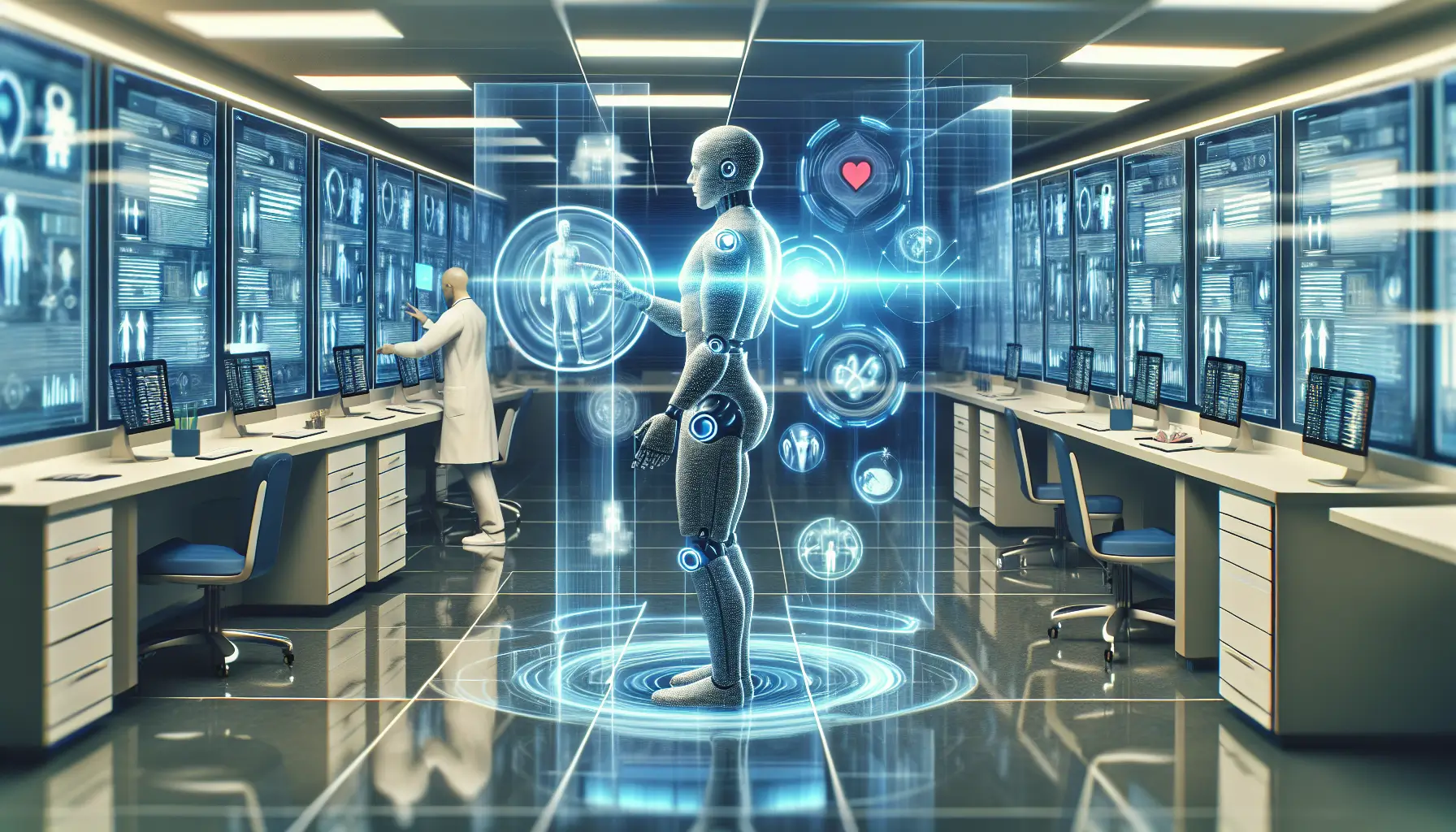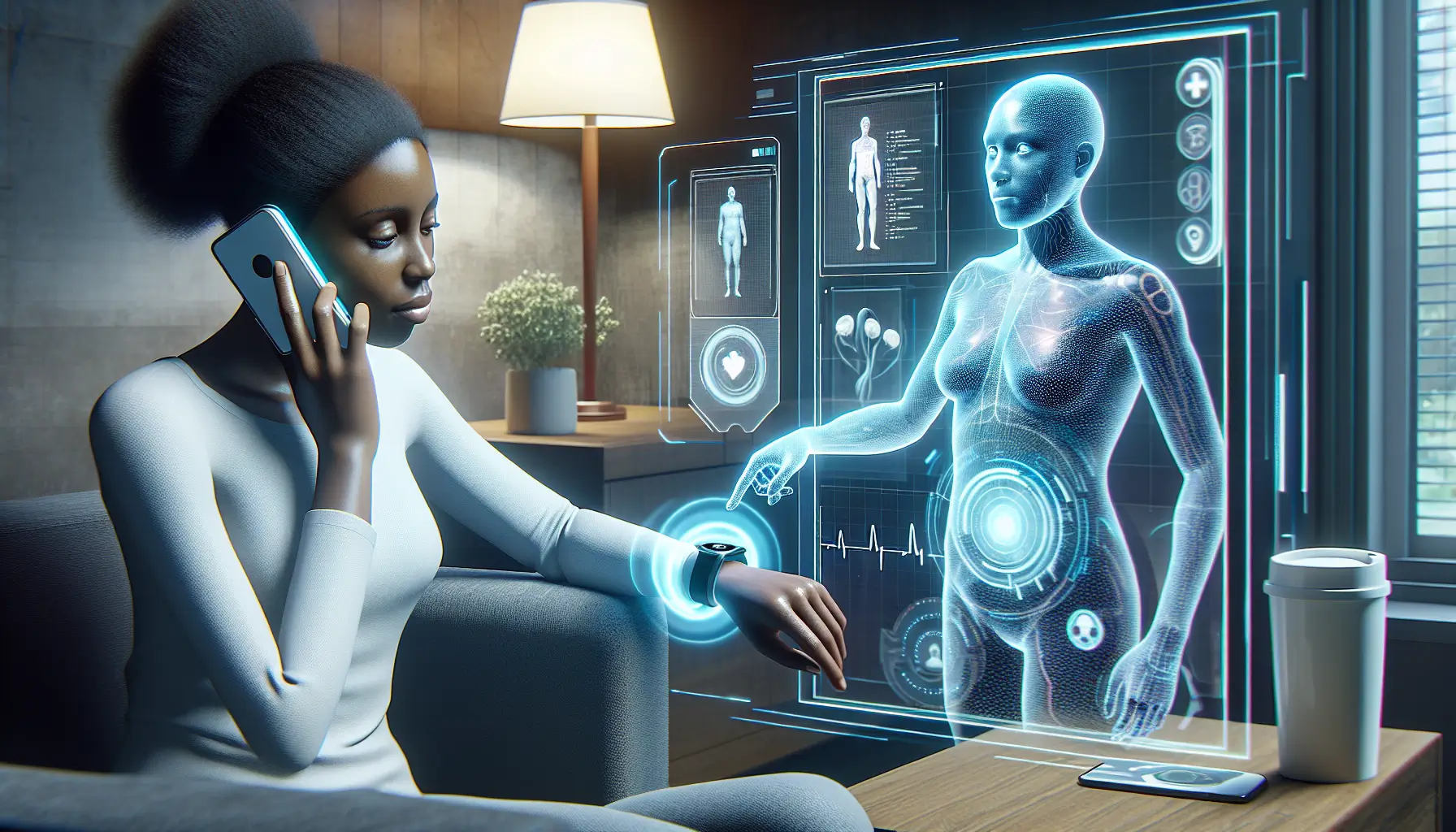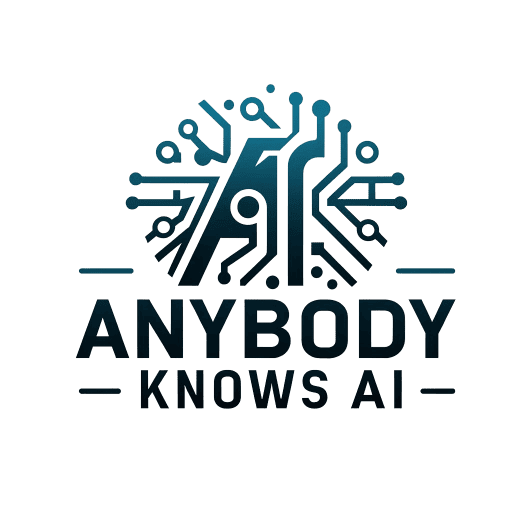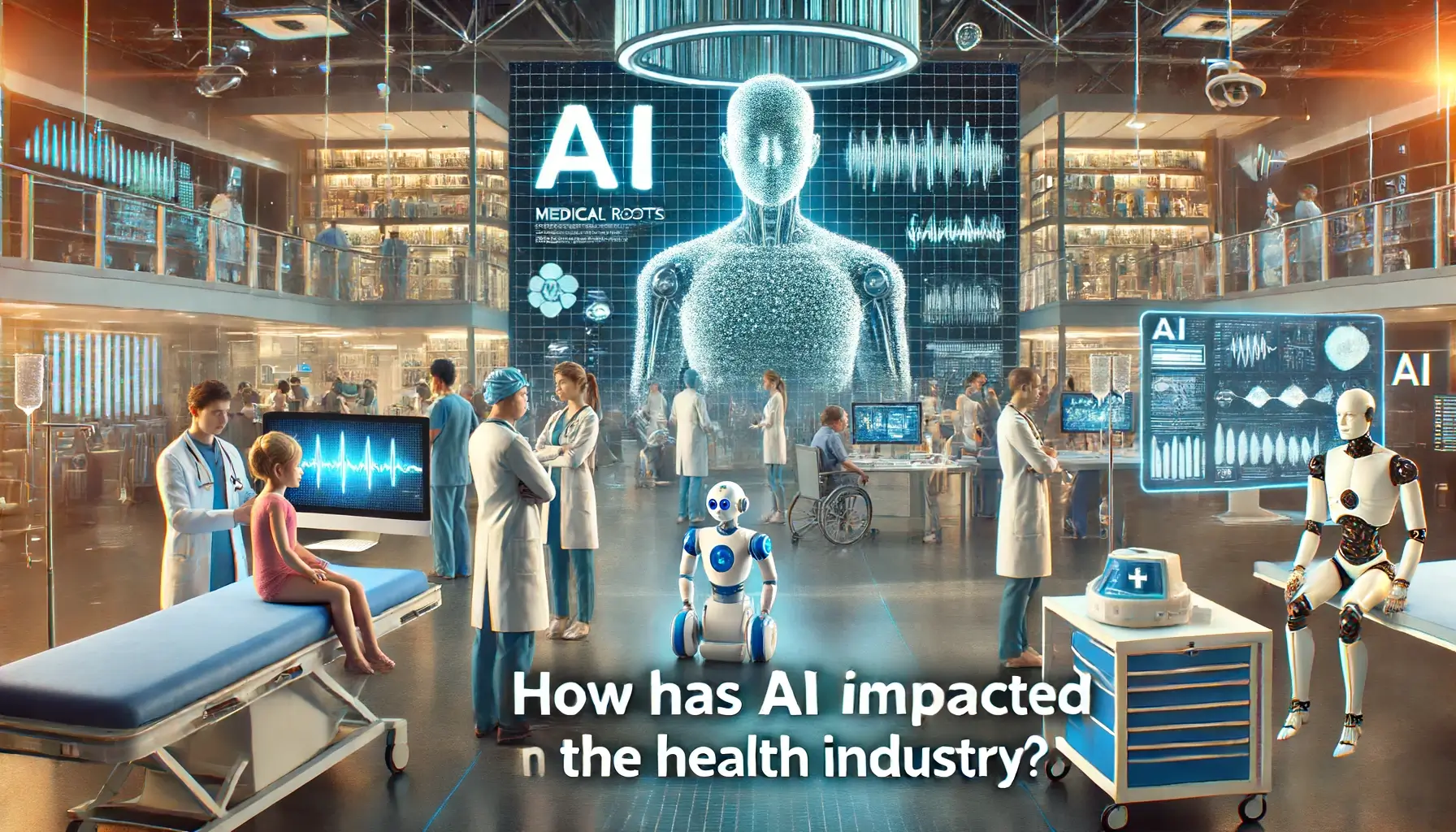The impact of AI on the health industry is evident across diagnostics, patient care, and record management. This article explores AI’s tangible shifts in healthcare practices and outcomes, emphasizing enhanced diagnosis, streamlined medical records management, and improved patient engagement.
By highlighting concrete examples, readers will gain insights into how AI has impacted the health industry, its current utility, and its potential to reshape health services.
Key Takeaways
- AI technologies, particularly machine learning and deep learning, are transforming medical diagnostics by enhancing the accuracy, efficiency, and precision of healthcare decision-making and patient care outcomes.
- AI-driven tools are redefining electronic health records (EHRs) by automating clinical documentation, minimizing errors, and integrating them into clinical workflows, thus easing the burden on healthcare professionals and improving patient care delivery.
- AI innovation in patient care includes developments in remote monitoring, telehealth services, and personalized treatment plans, all aimed at improving accessibility, engagement, and the overall patient experience, focusing on precision medicine.
| Impact Area | Description | Sources |
|---|---|---|
| Home Health Monitoring | AI technologies improve remote monitoring and management of chronic conditions, reducing hospital readmissions. | McKinsey, Healthcare Weekly |
| Telemedicine | Integrating AI in telemedicine allows for remote consultations, making healthcare more accessible. | Healthcare Weekly |
| Clinical Decision Support | AI enhances decision support systems by analyzing patient data, improving diagnosis accuracy and treatment effectiveness. | McKinsey, Chief Healthcare Executive |
| Personalized Medicine | AI personalizes treatment plans based on patient data, which is particularly beneficial in oncology, cardiology, and neurology. | McKinsey, Chief Healthcare Executive |
| Automation of Administrative Tasks | Automation of routine tasks frees up healthcare workers, reducing administrative burden and improving job satisfaction. | World Economic Forum, Deloitte |
| Addressing Workforce Shortages | AI helps mitigate workforce gaps by automating non-human tasks, allowing staff to focus on complex care. | Deloitte |
| Drug Discovery | AI accelerates drug discovery by analyzing datasets to identify new drugs and predict their effects. | World Economic Forum |
| Health System Operations | Optimizes resource allocation, predicts patient needs, and streamlines processes across healthcare facilities. | World Economic Forum, Healthcare Weekly |
| Regulatory and Ethical Considerations | Focus on regulatory frameworks ensures patient safety and data security, fostering transparency and trust. | Chief Healthcare Executive |
This table summarizes how AI will impact the healthcare sector in 2024, with descriptions and sources for further reference.
Enhancing Medical Diagnosis with AI

AI technologies have emerged as pivotal tools in medical diagnosis, revolutionizing how clinicians interpret health data and make life-saving decisions. By employing machine learning and deep learning to enhance cancer diagnosis, AI enhances the accuracy and efficiency of diagnostics, fostering precision medicine and improving patient outcomes.
From medical imaging to predicting health conditions, AI stands at the forefront of healthcare research, providing clinicians with powerful support for clinical decision-making. Uncovering the specifics, we see how AI is revolutionizing diagnostics in healthcare.
Machine Learning in Diagnostics
Machine learning, a subset of artificial intelligence, has significantly sharpened the precision of disease diagnosis, tailoring treatments and refining patient care. AI algorithms detect subtle changes in vital signs and uncover hidden patterns within extensive medical records. In healthcare, artificial intelligence enhances diagnostic procedures and lightens the workload for medical staff, focusing more on delivering personalized patient care.
Using the medical imaging data natural language processing (NLP) further aids in sifting through clinical notes, revealing conditions that may otherwise go unnoticed, and contributing to a more comprehensive approach to healthcare.
Deep Learning for Image Analysis
Deep learning models, particularly convolutional neural networks (CNNs), have revolutionized medical image analysis, providing nuanced insights into complex patterns associated with diseases. These models mimic the human visual system by training on extensive datasets, identifying specific features within medical images, and enabling more accurate disease classification.
The integration of interpretability techniques, such as attention mechanisms, further illuminates the regions within images that most influence the model’s decisions, enhancing the trust and reliability of AI in healthcare.
AI-Driven Predictive Diagnostics
The predictive prowess of AI is redefining clinical decision support and patient care. AI-based technologies are being used to:
- Flag at-risk patients for proactive interventions
- Refine population health management and the delivery of value-based care through predictive analytics
- Analyze vast data volumes to uncover symptom patterns and treatment responses
- Guide personalized care and enhance patient outcomes
In the face of global health challenges like COVID-19, AI has proven its worth, with predictive models offering rapid diagnostic tools and aiding mental health care.
Transforming Electronic Health Records (EHRs)

Electronic Health Records (EHRs), the backbone of healthcare documentation, are undergoing a transformative shift thanks to AI-driven tools. By automating aspects of clinical documentation and streamlining the EHR workflow, these tools are proving instrumental in improving health outcomes:
- reducing clinician burnout
- improving healthcare delivery
- enhancing patient care
- enabling healthcare organizations to operate more efficiently
AI’s adept pattern recognition capabilities ensure that health records are accurate and complete.
We will now explore how AI is transforming the realm of EHRs.
Streamlining Clinical Documentation
Natural language processing (NLP), a cornerstone of AI in healthcare, is rapidly transforming clinical documentation. With the ability to sift through and summarize a plethora of clinical data using human language, NLP systems facilitate quick access to essential patient information, elevating the quality of care.
Generative AI takes it a step further, preparing summaries and discharge documents, thus freeing clinicians from the burdens of extensive paperwork. This streamlined access to integrated health data is a game-changer for clinical practice.
Minimizing Errors in Health Records
In the quest for impeccable health records, AI emerges as a guardian against human error. Through the automation of review processes, AI swiftly flags inconsistencies in patient records, reduces human error, and ensures the accuracy of health information.
Adopting standard data formats and coding by health systems is essential for AI to operate effectively, enhance interoperability, and uphold the integrity of healthcare documentation, which is a vital step toward better health outcomes.
Integrating AI into Clinical Workflows
Incorporating artificial intelligence into clinical workflows showcases the transformative power of artificial intelligence in healthcare. While substantial integration projects like the Rapid Aneurysm tool exemplify AI’s potential in enhancing clinical decisions, the broader adoption of AI in EHR systems allows healthcare providers to reallocate time and attention to patient care.
This shift streamlines the workflow and marks a significant leap in healthcare delivery.
Innovations in Patient Care

The landscape of patient care is being reshaped by AI technologies, offering advancements beyond traditional healthcare settings. From sophisticated AI-enabled robotic assistants in surgery to innovative telehealth platforms, AI enhances the patient experience with greater accessibility and personalized care.
Exploring the various facets of AI in patient care reveals that these technologies are improving outcomes and redefining the patient-provider relationship.
Remote Monitoring and Telehealth
Remote monitoring and telehealth have taken center stage in the digital healthcare revolution, with AI-enhanced devices and platforms enabling continuous tracking of vital health metrics. AI’s analytical capabilities turn vast data points into actionable insights, facilitating personalized treatment plans and timely interventions.
Telehealth platforms, augmented with AI, offer streamlined services and foster patient engagement, making healthcare more efficient and accessible than ever before.
Personalized Treatment Plans
AI-powered systems are at the forefront of crafting personalized treatment plans, sifting through patient data with unprecedented efficiency. AI enables healthcare professionals to devise tailored treatment strategies that align closely with individual health needs by leveraging a patient’s medical history and a myriad of relevant data.
This approach to precision medicine ensures that each patient receives the most effective care tailored to their unique circumstances.
Enhancing Patient Engagement
AI-powered tools are revolutionizing how healthcare providers communicate with patients, fostering a new era of proactive patient engagement. Patients are empowered to take an active role in their healthcare journey through AI-powered chatbots, wearable devices, and telehealth platforms.
This interactive technology enhances the patient experience and leads to better health outcomes by encouraging patients to engage in their treatment plans fully.
AI’s Role in Drug Discovery and Development

The pharmaceutical realm is witnessing a paradigm shift with the introduction of AI in drug discovery and development. AI applications are speeding up the discovery of new treatments and personalizing medicine by analyzing vast biological datasets and developing sophisticated algorithms.
Investigating the specifics, we observe that AI is not simply streamlining the drug development process but also paving the way for the future of targeted therapies and optimized clinical trials.
Accelerating the Drug Development Process
Machine learning’s capacity to manage and scrutinize large-scale biological datasets transforms drug development. By predicting drug interactions and side effects, AI expedites the determination of a drug’s efficacy and safety, leading to quicker pharmaceutical advancements.
The role of AI in rapidly developing vaccines, as seen during the COVID-19 pandemic, underscores its potential in combating emerging global health threats.
Personalized Medicine and Targeted Therapies
The advent of AI-driven genomics has ushered in an era of personalized medicine, detecting genetic mutations linked to diseases and tailoring targeted treatments. AI’s predictive capabilities enable healthcare professionals to prescribe more effective customized drug therapies, revolutionizing the approach to patient care.
However, the ethical implications of using patient data in AI genomics raise important questions about consent and privacy, which must be addressed with transparency and care.
Optimizing Clinical Trials
AI revolutionizes clinical trials by enhancing design, recruitment, and data analysis. By sifting through large datasets and identifying key patterns, AI applications improve the efficiency of clinical trials, accelerating the development of new drugs and treatment options.
However, integrating AI into clinical trials necessitates focusing on privacy, security, and the validation of AI models to ensure patient safety and uphold the highest ethical standards.
Improving Healthcare Operations with AI

As AI technologies advance, healthcare operations are becoming more efficient and effective. AI is critical in streamlining healthcare processes, from automated administrative tasks to optimized revenue cycle management. This benefits healthcare providers by reducing their administrative burden and enhancing patient care by allowing medical professionals to concentrate on what they do best—caring for patients.
Revenue Cycle Management Optimization
AI technology is revolutionizing revenue cycle management in healthcare by introducing automation to enhance administrative tasks like billing and scheduling. This increased efficiency, especially evident in telehealth platforms, allows healthcare professionals to focus more on patient care and less on the burdens of administration.
By adopting AI-driven solutions, healthcare organizations can improve their financial health and provide a better patient experience.
Knowledge Management and Decision Support
In healthcare, where informed decisions are vital, AI-powered knowledge management and decision support tools are invaluable. Medical NLP systems are seamlessly integrated into clinical workflows, aiding healthcare professionals by providing intelligent assistance and evidence-based recommendations.
By identifying treatment gaps and ensuring comprehensive care, AI is establishing itself as a healthcare provider and an indispensable ally in clinical practice.
Reducing Repetitive Tasks
AI significantly impacts healthcare operations by taking over repetitive and manual tasks, granting medical professionals more autonomy over their workflow. With robust data cleansing practices, healthcare organizations can ensure high-quality data for effective AI functioning.
As AI systems become more prevalent, healthcare professionals may need to acquire new skills related to healthcare data analysis and AI health systems and management, reflecting the evolving demands of the healthcare industry.
AI and the Future of the Healthcare Workforce
The integration of AI in healthcare is transforming patient care and shaping the future of the healthcare workforce. Far from replacing human clinicians, AI systems are designed to complement and replace human clinicians or augment their capabilities, automating routine tasks and enhancing overall job satisfaction.
Investigating AI’s influence on the healthcare workforce, we’ll consider its impact on job roles and the implications for healthcare and healthcare professionals themselves.
Complementing Healthcare Providers
AI applications in healthcare enhance job satisfaction and reduce workforce burnout, leading to a better work-life balance for medical professionals. By taking over administrative and routine tasks, AI allows healthcare providers to dedicate more time to what truly matters—their patients.
This synergy between AI and human clinicians is creating a more efficient and fulfilling work environment in the healthcare sector.
Automation of Routine Jobs
The automation of routine jobs in healthcare directly results from AI advancements, leading to sophisticated software capable of performing various tasks. While some healthcare roles, particularly those involving digital information, are more susceptible to automation, the overall impact on job security remains complex.
Factors such as cost, labor market dynamics, and regulatory acceptance will influence the extent of automation and its implications for the workforce.
Preparing for Change
Organizations must prepare for change as AI becomes integral to the healthcare landscape. By developing training programs focused on AI integration, healthcare institutions can reduce the risk of job displacement and ensure a smooth transition.
Emphasizing the enhancement of human capabilities with AI tools, rather than their replacement, will be key to fostering a cooperative and progressive healthcare environment.
Addressing Ethical and Safety Concerns
The rise of AI in healthcare brings myriad ethical and safety concerns that demand rigorous governance. Issues of bias, transparency, and data privacy are at the forefront, requiring adherence to the core principles of medical ethics.
Investigating the ethical implications of AI, we realize the importance of accountability and patient data protection in maintaining trust in AI-driven healthcare systems.
Ensuring Patient Privacy and Data Security
In the age of AI-driven healthcare, safeguarding patient privacy and data security is more critical than ever. With AI systems handling vast amounts of personal health information, robust data privacy measures must be in place to prevent misuse.
Encryption, adherence to stringent regulations like HIPAA and GDPR, and advanced techniques like federated learning are essential for maintaining the confidentiality and integrity of sensitive patient data.
Informed consent is also crucial, necessitating transparent communication about the use and risks of AI in healthcare.
Algorithmic Transparency and Bias
Achieving transparency in healthcare AI systems is challenging yet essential to address. The lack of public transparency in medical AI products can lead to uncertainties regarding their safety and risks. Addressing algorithmic biases is particularly important to prevent the exacerbation of health inequities and to ensure fair and equitable healthcare for all.
Detailed documentation and peer-reviewed publications enhance transparency, while legally mandated requirements for comprehensive transparency can protect end-users and uphold ethical AI principles.
Maintaining Patient Safety
Patient safety remains the cornerstone of healthcare, and AI technologies are held to the same high standards. Before AI tools are implemented in clinical settings by medical providers, they must demonstrate the following:
- Robustness and the ability to handle the complexities of real-world patient data
- Scrutiny over AI’s decision-making processes
- Rigorous testing
- Compliance with regulatory standards
These steps are non-negotiable to ensure these technologies can be trusted to support healthcare professionals without compromising patient welfare.
Summary
As we conclude our exploration into AI’s impact on healthcare, it’s evident that AI is not just a technological novelty but a transformative force driving improvements across diagnostics, patient care, and operational efficiency.
By complementing the expertise of healthcare professionals and addressing ethical considerations, AI is poised to continue its trajectory, shaping a future where healthcare is more accessible, personalized, and efficient. Embracing this evolution, the healthcare industry can anticipate a new era of innovation and improved health outcomes.
Frequently Asked Questions
How does AI improve the accuracy of medical diagnoses?
AI improves the accuracy of medical diagnoses by using advanced algorithms to interpret complex health data, detect subtle changes in medical images, and predict patient outcomes with greater precision than traditional methods. This ultimately leads to more accurate diagnoses that improve patient outcomes.
Can AI in healthcare lead to job displacement among healthcare professionals?
AI in healthcare is designed to complement the work of healthcare professionals and enhance job roles rather than lead to job displacement. It focuses on improving efficiency in the healthcare sector.
What are the ethical concerns related to the use of AI in healthcare?
The ethical concerns related to the use of AI in healthcare encompass algorithmic transparency, big data, bias prevention, patient privacy, informed consent, and accountability for AI decisions. These are critical considerations for ensuring ethical and responsible integration of AI in healthcare.
How is patient privacy protected when using AI in healthcare?
Patient privacy is safeguarded in healthcare AI through encryption, adherence to regulations such as HIPAA and GDPR, and advanced techniques like federated learning, which enable collaborative model training while maintaining data confidentiality. These measures ensure the protection of patient information.
What steps are taken to ensure the safety and reliability of AI in healthcare?
To ensure the safety and reliability of AI in healthcare, AI tools undergo rigorous testing, clinical trials, peer reviews, and compliance with regulatory standards and certifications to establish their reliability and safety. These steps are crucial for ensuring the effectiveness of AI in clinical settings.







